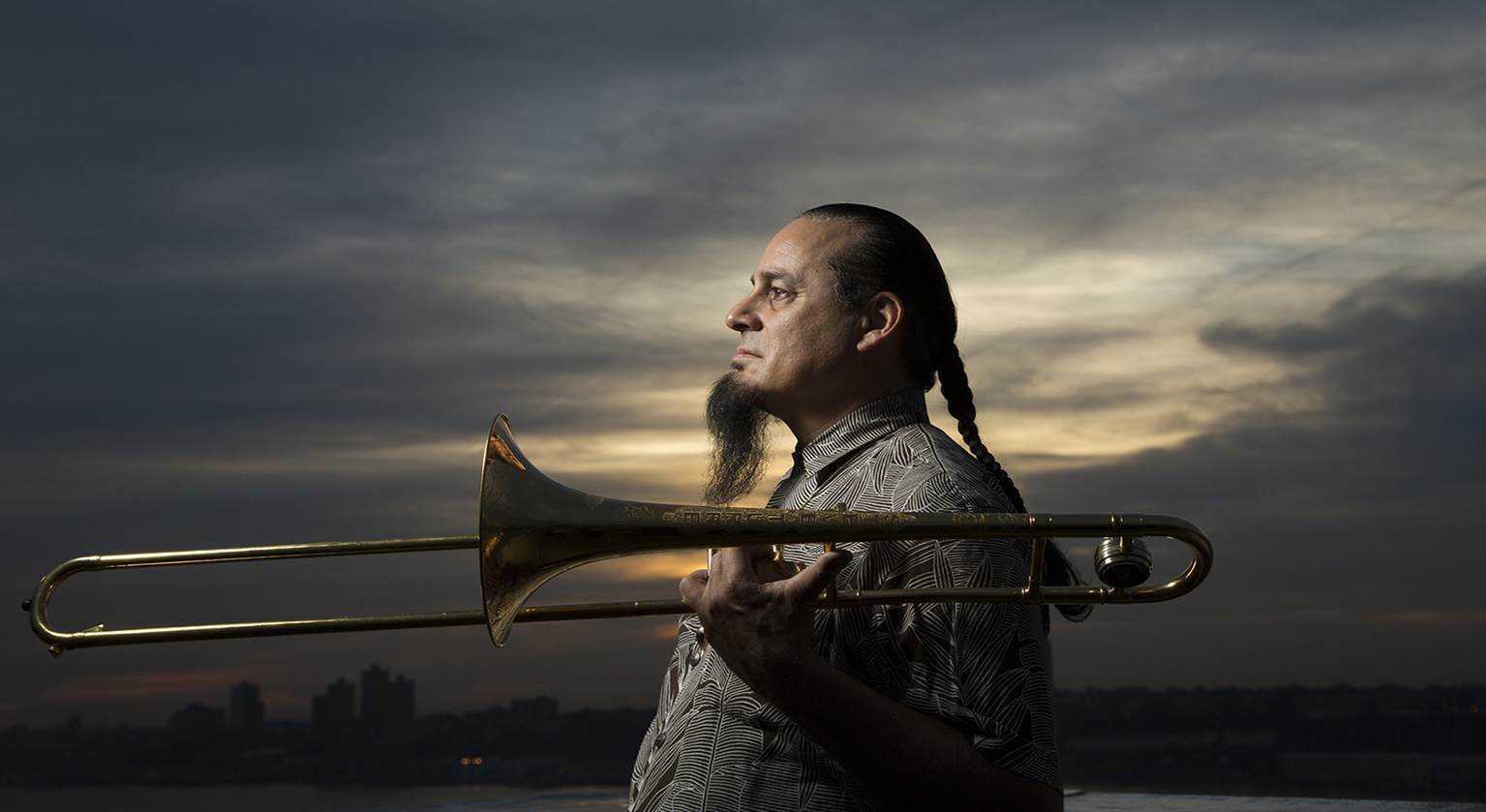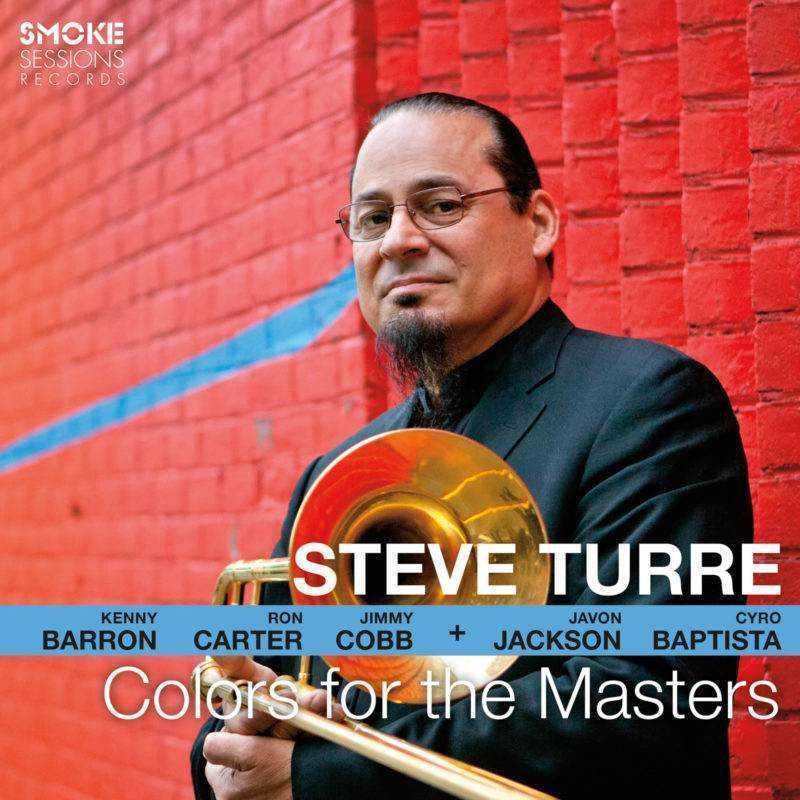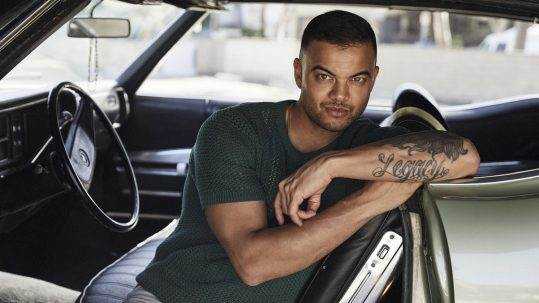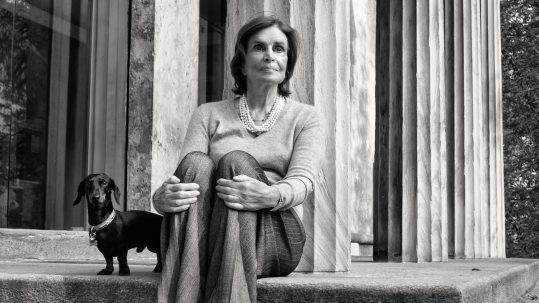
04 Oct Steve Turre
Photo: Courtesy of Steve Turre
STEVE TURRE
Praised by his peers, acclaimed by audiences on seven continents, Steve Turre is recognized as one of the best trombonists in the world, a pioneer in using seashells as an instrument. We sat down for a talk with a man at peace with himself and on a mission to bring joy and happiness to the world.
By Victoria Adelaide + Brooks Giles III | OCT 23. 2017
Victoria Adelaide + Brooks Giles III: How did you start playing the seashell and where did the idea come from?
Steve Turre: Well, I started to play the shell in 1970. I used to play with a great jazz musician named Rahsaan Roland Kirk. One time when he came to town, I played with him and he had a shell, just one shell, and he would pick it up sometimes and blow a note on it. But the sound was so beautiful, I liked the sound of it, it made me feel good, made me feel peaceful. So, I got one and I started to just play one note and then one day I discovered that if I put my hand inside, it can change the note. So, through experimentation over the years, I developed what it is that I do; I did not learn that in a school.
VA+BG: What was people’s reaction when you started to introduce the “shell” as an instrument?
ST: Well, for the most part, people really liked it. 90% of the people really liked it and 10% of the people did not like it at all. But it’s funny, either they really liked it or they really didn’t like it.
VA+BG: You mean in America?
ST: Yes, but it’s different everywhere you go. In different countries, different cultures use the shell and people appreciate it in a different way than in America. Americans, to me, their understanding of art is very limited, it’s more about money. My main instrument is the trombone, but the shell is from my roots which are in Mexico. Because in ancient Mexico people played the shell, the Aztecs, the Maya, in the Caribbean, people play the shell, the Inca, in Peru and South America people play the shell and in Polynesia, Hawaii, in Maui, Tahiti, they play the shell; in Africa, they play the shell, in India they play the shell, in Europe, they do not play the shell.
VA+BG: What attracted you initially to the trombone and who were your first influences on the instrument?
ST: Well, I started to play the trombone in a school band in 4th grade. I think I was around 9 years old, 10 years old something like that. At first, I just played the little songs that the little kiddies play, and then in middle school, they had a jazz band, so I started to play jazz and I really liked it. At first, I played New Orleans’ traditional jazz , ‘When The Saints Go Marching In, Muskrat Ramble, Tin Roof Blues’, these kinds of songs. Then, later in high school, I heard about a recording from master trombone player, Jay Jay Johnson, he played with Charlie Parker. He brought the trombone to bebop and just like Charlie Parker, he played on such a high level that nobody has surpassed this level yet. He is the Grand Master, Jay Jay Johnson. I think for jazz, he is my number one influence. But there are many others as well.
VA+BG: What musical lessons did you learn from playing with Ray Charles, Rahsaan Roland Kirk, Dizzy Gillespie, Art Blakey or McCoy Tyner?
ST: Well, I learn something different from each master that I play with. But the first real tour that I traveled and everything was with Ray Charles, and that was very special too. But locally I would play with Roland Kirk when he would come to the San Francisco Bay area. I grew up in the San Francisco Bay area, in a town called Lafayette, on the east bay. So, when Roland Kirk would come to town, I would just play for a week with him, twice a year. But then I got to go with Ray Charles, and I got to travel all over the world, really play the big concert halls and the big festivals, it was so exciting. In both Ray Charles and Roland Kirk, the essence of the music is the blues. And this is very important. This is the roots of music, the blues. So many of the young players today do not know how to play the blues, it’s a shame. They just want to make money and they don’t look at it as culture, they just look at it as business.
Also, you mentioned McCoy Tyner, and he was very important to me. McCoy Tyner was John Coltrane’s piano player, and he was part of that sound and the spirit of that music, and music wouldn’t have happened the way it did without McCoy. It was a collective effort, but Coltrane was the leader of that direction. But when I played with McCoy, he enabled me through his accompaniment in spirit and energy, to play things that I just couldn’t play with other people. You know, he is an enabler; he is profound, it is beyond technique, it is beyond notes, it comes from the universe. And I loved McCoy Tyner, he had a profound influence on me. Also, I worked a lot with Dizzy Gillespie. And he is one of the fathers of bebop along with Charlie Parker. And I learned so much about music from him, and what a wonderful human being Dizzy was besides being a genius musician; he was such a warm and wonderful human being. You know, he taught me a lot, that we’re so fortunate to be musicians and so we have to give back, in other words appreciate your audience. For instance, Dizzy wrote a very very famous song called ‘A Night in Tunisia’, and we played it every night, and I asked Dizzy, I said, ‘don’t you ever get tired of playing that song?’, and he said, ‘no’. I said ’why?’; he said, ‘I am so happy that the people want to hear it. I wrote it and if I don’t play it for them, they’ll be disappointed. So, I’m happy to play it for them’. And that really rang a bell with me, ‘oh yeah that makes so much sense’, you know, and where some musicians are very selfish, ‘I played them, I’m not gonna play them anymore. I’m gonna play what I want to’. That’s just being selfish. But to be a real healer to the music, yes you have to blunt your feeling and your creativity, and you play that too, but it’s also… you have to give, and if to play a song that the people want to hear makes them happy, I think it’s good to play it. Ray Charles was like that too. He would play Georgia every night. That’s a famous song he did and I understand it, you know…
VA+BG: In your family background you also have many musicians…
ST: My younger brother played drums with Ray Charles for 18 years. But I played just for one year with Ray Charles and then when he took his Christmas break, I came back to San Francisco and I played with Art Blakey, and he asked me to join the Jazz Messengers and he brought me to New York City. And I’ve been in New York ever since the spring of 73.
VA+BG: You said earlier that so many young musicians do not know how to play the Blues. What would you say to the young generation of jazz musicians?
ST: If you don’t know where you’re coming from, you don’t know where you’re going. You have to understand your roots, you have to understand the culture that the music comes from to take it forward.
VA+BG: Even if you were born in America, your Mexican heritage and your roots have always been very present in your music.
ST: Yes sure. But here is the thing. Latin music, Afro-Cuban music you know, and Jazz music, all of the music in Latin America, it all has its roots in Africa because of the slave trade from the Europeans. So, during colonial times, jazz music came from Black people. And this is very important. People that don’t want to acknowledge this, or to understand it, to understand the rhythm of Africa, they don’t know jazz, they don’t play jazz. Just because music is instrumental, and just because it’s improvised doesn’t make it jazz. Today the corporate music industry, record companies, any music that’s instrumental and improvised, they call it jazz. But this is not true, you know. And to give you an example, India has great tradition, instrumental music that is thousands of years old, the ‘Raga’. It’s a method to improvise on the scale called the ‘Raga’. It’s profound music. It’s not jazz and it’s been around before jazz. But for some reason now, especially when people improvise instrumental music, they call it jazz. Jazz comes from an African source, rhythmically and in the language of the rhythm and in the blues.
VA+BG: So if you don’t understand its African source, you cannot understand jazz?
ST: Well I mean, nobody understands everything about it. You didn’t grow up in Africa. But you have to study it, you have to learn about it, you have to acknowledge it, you have to learn to feel it, not think it, you have to feel it. Just because you can read the notes on paper and think it in your head, that doesn’t make it music. Music comes from your heart. You have to feel it.
VA+BG: ‘Colors for the Masters’, your new CD; you said it was a dream for you to play with these masters on a recording of your music. How special was it to have all those masters playing in your new record?
ST: Well, the three gentlemen I’m taking about, Ron Carter, Jimmy Cobb and Kenny Barron, they’re all older than I am. So, they’ve experienced things that I wasn’t able to experience, because they lived before me. And this is a language, it’s a spirit in the air. To play with such quality takes you to a higher level, to where you don’t have to prove anything, you don’t have to try to show off. You can just play purely from the heart, it’s ok to leave space, it’s ok to just say something simple and it means something. Youths have a lot of energy and enthusiasm, but the wisdom comes from the elders. So, this gave me an opportunity to gain more wisdom and experience it in real time and document it. Plus, we’re all friends, so it was a very good vibration, everybody was beautiful, it was all about the music, no ego.
VA+BG: Do you still have a dream musical project, and if so what is it?
ST: Oh yes, sure. I’ve got lots of things I’d like to do. I’d like to do another record with my shell group, with my big group. I did many records for Verve in the 90s, 3 CDs, the first one was called ‘Sanctified Shells’, the second one was called ‘Rhythm Within’, and the 3rd one was just my name ‘Steve Turre’. And I have more music for this group that I wasn’t able to record, and someday I’d like to do that music. But it’s a very big group, it’s 13 people minimum, and the record companies don’t want to pay that much money, to pay that many musicians; they just want me to do a small group. One of my dreams is to take my shell group on a world tour. You know, back in the 80s, I did a tour with this great trumpet player, ‘Woody Shaw’, with whom I play with a lot, I learned a lot from Woody about improvisation and harmony. We went to India, to the Middle-East and North Africa, and I’d like to take my group to play in all the villages, and in countries where people don’t have the money to go to the big concert halls, to the big festivals, the commercial venues and all that, and to play for them, just to play the music for them.

VA+BG: Your two children are also excellent musicians. Andromeda your daughter is an excellent singer and Orion your son, a drummer.
ST: Yes, Orion, he plays drums with me and he plays with Andromeda too. It’s wonderful, I love it! You know I have to tell you, I just got married this past Sunday and Andromeda and Orion had a band and they played for my wedding and it was a wonderful big party. We had a jazz party for the wedding reception, it was big fun. I’m very proud of them. I love playing with them, it just feels so natural, good feeling, yes.
VA+BG: When it comes to your own music, it is said that you always keep one foot in the past and one in the future. How do you see jazz music evolve?
ST: I cannot predict what is going to happen, only the future can tell. I try to live in the moment as much as possible. I don’t worry about what’s going to happen and I try and learn about what has happened, so that I can make the most of this moment now. And you know, there are young people that are very interested in real jazz and sincere, but there are not many of them, but there never has been. How many Charlie Parkers are there? How many John Coltranes are there? Not many. So, you know, it’s gonna be ok (smiles).
VA+BG: Since the beginning of this conversation, the way you talk about life and music, sounds very spiritual to me, is it?
ST: Oh yes it is. Because outside of the fact that I make a living in music, I realize the reason humanity has music is not to make money; music was not created to make money, it was created to bring people together. And all different cultures all over the world have their own kind of music. All people, everybody: Eskimo people, Aboriginal people, African people, Asian people, European people, Native American people, everybody has music. Differences, all different and that’s what makes it beautiful. I’d like to hear different kinds of music, not music created for money, but music created from the culture of the people. Music is part of our planet, it’s deeper than human beings, whales sing, oh they sing beautifully; dolphins make sound, birds sing, frogs sing and insects… And music is part of our planet, it’s in the spirit of this planet. I’m still evolving. In 1976, I became a Buddhist. I’ve been practicing Buddhism since 1976.
VA+BG: If you were not a musician what would you be?
ST: I think I would like to do something in nature. Maybe work in a national park, or work as a gardener. Something that involves nature. I think I would like that if I were not in music.
VA+BG: What do you expect from the release of your new CD?
ST: Well, it documents my music in that particular moment in time. I hope people will enjoy it. I’m proud of it indeed. It represents my best effort on that day, and it will represent my life’s work when I pass on; you know I’m good with that. I also hope people will enjoy it, which would then enable me to do more live performances, because for me the biggest joy is not the recording studio, the biggest joy is to play live for people. I think that’s what a real musician does; if you give, your life force becomes the sound and the energy of your body, and your life and your spirit produce the sound that people feel, and this can heal them. A musician is like a doctor, you’re supposed to make people feel better. That’s why the drum machine and electronics and pop music and all that, that’s about money, that’s about entertainment; it’s like going to the movies or something. Then I like to go to the movies, but it’s a different experience.
...You have to understand your roots, you have to understand the culture that the music comes from to take it forward``.






